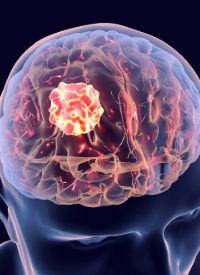NF1-Associated PNs |
Image Credit: © Dr_Microbe
– stock.adobe.com

The European Commission has granted conditional marketing authorization for mirdametinib (Ezmekly) for the treatment of symptomatic, inoperable plexiform neurofibromas (PNs) in adult and pediatric patients 2 years of age and older with neurofibromatosis type 1 (NF1).1
The approval was supported by findings from the phase 2b ReNeu trial (NCT03962543) evaluating the efficacy and safety of mirdametinib in patients with inoperable NF1-associated PNs.
Findings showed ReNeu met its primary end point, with adult patients (n = 58) achieving a confirmed objective response rate (ORR), as determined by blinded independent central review, of 41% (n = 24/58); pediatric patients (n = 56) experienced an ORR of 52%. The median best percentage change in target lesion size was –41% (range, –90% to 13%) in adult patients and –42% (range, –91% to 48%) in pediatric patients.
Among adult patients with a confirmed response, 88% experienced a duration of response (DoR) of at least 12 months, and 50% maintained their response for at least 24 months. In pediatric patients, 90% had a response lasting 12 months or longer, and 48% had a response lasting at least 24 months.
Additionally, mirdametinib treatment led to early and sustained improvements in pain and quality of life, which were measured using multiple patient-reported outcome (PRO) tools.
“Patients with [NF1-associated PNs] often face physical and mental health challenges and impaired quality of life given the limited treatment options available for this lifelong and debilitating disease,” Ignacio Blanco, MD, PhD, Chairman of the National Reference Center for Adult Patients with Neurofibromatosis at Hospital Universitari Germans Trias Pujol, Spain, stated in a news release. “This approval represents an important advance, especially for adults who previously did not have an approved treatment. In clinical trials, [mirdametinib] demonstrated an encouraging efficacy and safety profile in both adults and children, and importantly, is available in a tablet that dissolves easily in water for people who are unable to swallow a pill and could therefore not previously receive therapy.”
In February 2025, the FDA approved mirdametinib (Gomekli) for adult and pediatric patients 2 years of age and older with NF1 who have symptomatic PNs not amenable to complete resection.2 This regulatory decision was also supported by data from ReNeu.
ReNeu Trial Breakdown
The ReNeu trial is an ongoing, multicenter, open-label, single-arm phase 2b study designed to evaluate the efficacy, safety, and tolerability of mirdametinib in patients 2 years of age or older with inoperable PNs associated with NF1 resulting in significant morbidity.1
A total of 114 patients were enrolled and treated with mirdametinib orally at a dose of 2 mg/m² twice daily (with a maximum dose of 4 mg twice daily) using either a capsule or dispersible tablet formulation. Treatment was given according to a 3-week-on, 1-week-off schedule and could be taken without regard to food.
The primary end point of the trial was confirmed ORR, defined as the proportion of patients who achieved reduction of at least 20% in target tumor volume on 2 consecutive MRI scans within the 24-cycle treatment period. Tumor assessments were conducted by blinded independent central review. Secondary endpoints included safety and tolerability, duration of response, and changes in PROs from baseline to cycle 13.
Safety Analysis
Mirdametinib demonstrated a manageable safety and tolerability profile, showing that among adult patients, the most commonly reported adverse effects (AEs) reported in more than 25% of patients included dermatitis acneiform (83%), diarrhea (55%), nausea (55%), elevated blood creatine phosphokinase levels (47%), musculoskeletal pain (41%), vomiting (37%), and fatigue (36%).
In pediatric patients, the most frequently observed AEs that occurred in more than 25% of patients were elevated blood creatine phosphokinase levels (59%), diarrhea (53%), dermatitis acneiform (43%), musculoskeletal pain (41%), abdominal pain (40%), vomiting (40%), and headache (36%).
“Bringing innovation to patients living with rare tumors around the world is a clear reflection of our focus on addressing significant unmet needs and transforming outcomes for patients and their families,” Jan Kirsten, global head of Rare Tumor Business at SpringWorks Therapeutics, added in a news release. “With the European approval of [mirdametinib], the first therapy approved for both adults and children with NF1-PN, we are taking a major step toward improving care for this underserved community and are committed to making our medicine available to eligible NF1-PN patients across Europe as quickly as possible.”
References
- The European Commission has granted conditional approval of Ezmekly (mirdametinib) for the treatment of adult and pediatric patients with neurofibromatosis type 1–associated plexiform neurofibromas (NF1-PN). News release. SpringWorks Therapeutics. July 18, 2025. Accessed July 21, 2025. https://springworkstx.gcs-web.com/news-releases/news-release-details/european-commission-grants-conditional-approval-ezmeklyr
- FDA approves mirdametinib for adult and pediatric patients with neurofibromatosis type 1 who have symptomatic plexiform neurofibromas not amenable to complete resection. FDA. February 11, 2025. Accessed July 21, 2025. https://www.fda.gov/drugs/resources-information-approved-drugs/fda-approves-mirdametinib-adult-and-pediatric-patients-neurofibromatosis-type-1-who-have-symptomatic